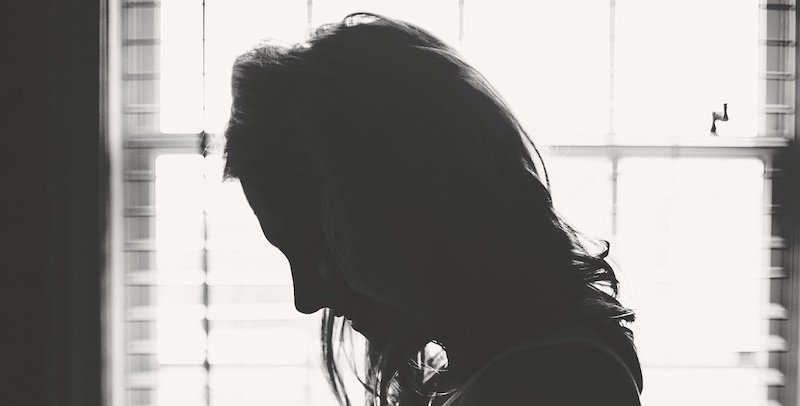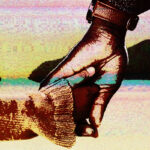Drifters, Searchers and Observers: In Praise of Quietly Unlikable Women
Mesha Maren on the Sisters of Longing Who Inspire Her Work
The air is fuzzy around us, the slowly diffusing blue of a long summer evening turning into night. My sister will be going to college soon but for one more week, we still share a bed. The roseprint sheets are tangled around our legs and spread among them are the soft pastels of a dozen Mothering magazines.
“What if I don’t meet someone I want to have kids with?” she asks and her face is so sincere I can’t look away. She wants so badly to be a mother. She is 18. I am 15. Her desire is so intense it ripples around her and pushes me away. Throughout my childhood, I’ve mostly thought of myself as a slightly less adequate version of my sister. I’ve been in training. When I get older and better, I will become my big sister.
But here, in this moment, a crack forms. I don’t have any interest in kids, in mothering, in building a family. It is her intensity that scares me though. I fear that I will never want anything the way she wants motherhood.
I found in these women not just drifters but searchers.Throughout the years to come, my sister will tell me that I just need to give it a little time. Soon, I will want to be a mother. It never happens. And the fear of not knowing what it is that I want instead shadows me as I move across the country picking up waitressing jobs and dancing at strip clubs and dreaming about making movies, taking pictures, writing stories. Through it all, I am envious of my sister’s focus.
I am in my mid-twenties when I first watch Wanda, Barbara Loden’s 1970 directorial debut about a young woman from the Pennsylvania coalfields who drifts away from her husband and children towards an uncertain future on her own. The first time I saw the film I felt some jolt of connection, but I could not say why. It was upon rewatching it, a year later and soon after reading Joan Didion’s Play It As It Lays, that I started to understand my delight at seeing stories that focused on women feeling their way along the margins of their lives.
“She doesn’t know what she wants, but she knows what she doesn’t want,” Loden said of Wanda in an interview on the Mike Douglas Show. “Life is a mystery to her.”
What to do with a life where mothering is not the sole or even the main focus?
“When you have a child, so begins the braiding,” singer-songwriter Aldous Harding writes. “And in that braid you stay.”
But what if you don’t stay? Or what if you don’t even begin the braid?
My sister has always been very good at braiding. Sit still, she would command me, no wiggling, and my head would be transformed into a fishtail.
In her essay “Wanda: A Miracle,” critic Amy Taubin recalls the time period when Loden’s film was released. “In those early days of the second wave of feminism, the movement was divided as to whether it should be focusing its energies on the liberation of all women or, more pragmatically, on that of the exceptional ones, or at least the ones who were clearly motivated to become exceptional.” The problem was not that Wanda was unfulfilled by motherhood, the problem was that she did not know what it was that she wanted instead. This made her intensely unlikable to many critics.
Anna Bogutskaya writes in her book Unlikable Female Characters, “the silent implication of being unlikable is that it’s a free pass to be dismissed, disrespected, and disempowered. If you are deemed unlikable, you have refused to be a part of the machine of femininity, so you are fair game. You can, and perhaps should, be punished, taught a lesson, put in your place.” When Bogutskaya talks about “unlikable women” she is mostly talking about a certain type of unlikability. “In pop culture,” she writes, “I was always drawn to women who were unapologetically angry, horny, ambitious, and even bad, who got away with cons and murders, acting out and misbehaving.” These are the prototypical unlikable bad girls. I like them too.
The autumn after my sister left for college, I became infatuated with two girls at my middle school who were expelled for making out with each other in the girls’ bathroom. They were loud goth girls—black lipstick, ripped-up jeans. I was obsessed with them. But they barely noticed me as I drifted along the hallways. Wanda is a drifter, not a shouter, an ‘unlikable’ heroine for those of us who have struggled to articulate our desire and rage.
After Wanda, I found Joan Didion’s Maria Wyeth (“I am what I am. To look for “reasons” is beside the point.”) and then I found Joy Williams’ Pearl (“There was a young woman sitting in the bar. Her name was Pearl. She was drinking gin and tonics and she held an infant in the crook of her right arm. […] The heavy white air hung visibly in layers. Pearl could see the layers very clearly. The middle layer was all dream and misunderstanding and responsibility. Things moved about at the top with a little more arrogance and zip but at the bottom was the ever-moving present. […] Pearl was always conscious of this. It made her pretty passive and indecisive usually.”) I circled around to Helen Garner’s Nora and rediscovered Kate Chopin’s Edna (“She liked then to wander alone into strange and unfamiliar places.”)
I found in these women not just drifters but searchers. As John Powers said in his review of Wanda, “You see, just because she can’t articulate her desires, doesn’t mean she doesn’t yearn for something more.”
The yearning, that inarticulable yearning, was the thread that wove these women together for me. In 2019, another voice joined this chorus. The voice came from inside my own head, but it was not my voice. The voice was young and it was strong. I jotted down a few phrases at first. I was always in the hallways of life, always outside listening in. I could see a few images. A young woman lay on a blue couch. Time passed around her. She feared that everything would always keep on passing. Her voice was curious, but it did not fully trust itself. Sometimes I saw her up on a hill, in the high yellow grass, moving, searching. This young woman was Shae. I listened to her, and she told me. She told me about her love for Cam, she told me about her pregnancy, she told me about her fear that she would never know what it was that she needed.
It was not until after I finished a first draft of Shae that I stepped back and saw her in the context of the ladies of unarticulated yearning. While I was writing, I was thinking more directly about other searchers: Denis Johnson’s Fuckhead, Anne Carson’s voice in “The Glass Essay,” and the protagonists in Gregory Crewdson’s photographs. But throughout the revision process, I began to see Shae as a sister of longing. She, like the women in Loden and Didion and Williams and Garner and Chopin’s work, is a young mother but the mothering is not enough.
In the fall of 2023, as I was completing final edits on Shae, I visited a career-spanning Judy Chicago show at The Whitney. On the 3rd floor, Chicago had created an exhibition within the exhibition. She called it “The City of Ladies,” named after medieval writer Christine de Pisan’s The Book of the City of Ladies, a catalog of women in history. In Chicago’s ‘City of Ladies,’ O’Keeffe’s “The Black Iris” hung beside early drafts of Dickinson poems and a Zora Neale Hurston film played alongside a painting by Artemisia Gentileschi. Chicago described this exhibit as an “exploration of artistic influences and reverberations across history […] an “introspective” rather than a retrospective.” Chicago’s own work resonated even more eloquently within this context.
I visited Chicago’s exhibition three times during my final month of editing Shae. I kept going back to The City of Ladies because I saw there a beautiful echo—not a reflection but a communion. In her introduction to Williams’ The Changeling, Karen Russell writes that the novel is “not a mirror: it’s a window. […] its language opens a portal into the “cold, inaccessible depths.” Its project is annihilating transformation.”
With Shae, I wanted to construct my own window—a window into the City of Unbraided Ladies, where my narrator and my younger self could form a sisterhood with Wanda, and Nora, and Pearl, and Maria, and Edna. The window is there now—climb on through.
__________________________________

Shae by Mesha Maren is available from Algonquin Books, an imprint of Hachette Book Group.




















